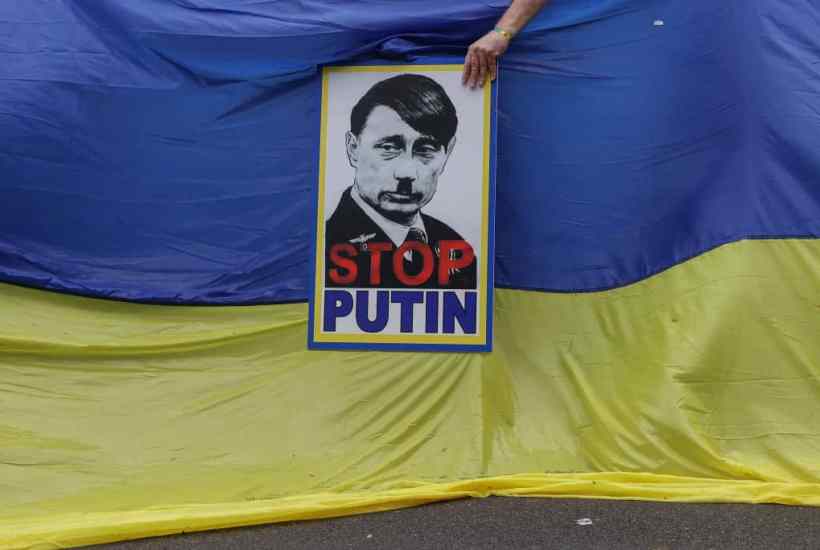That English history lessons consist of World War II and the Tudors has come back to bite us again. The obsessive focus on learning about the 1940s means there is one historical figure Vladimir Putin has been repeatedly compared to in recent days: Adolf Hitler. It’s an unhelpful comparison, to say the least.
From the Sun calling Putin ‘the Hitler of our age’ to Defence Secretary Ben Wallace’s ‘whiff of Munich’ remark, the build up to the war looms large in the British imagination. But while Putin is a nasty piece of work, he is not genocidal. And Hitler, unlike Putin, wasn’t armed with nuclear weapons. The motivations, intentions, and capabilities of both men bear little resemblance to one another. Even by the usual standards of British political debate, comparing opposition to no-fly zones or other forms of Western intervention with appeasement is a particularly unhelpful rhetorical tic. There is a desperate willingness to interpret Putin through the experience of opposing Hitler. Yet this comparison tells us little about what motivates the man responsible for the Russian invasion of Ukraine.
The problem with viewing the world through one of four lenses – modern Britain or America, the Tudors, or the Second World War – is that most events do not belong to one of these categories. Trying to interpret Putin in such a way results in a total breakdown of understanding. The point of historical analogy, after all, is to improve our grasp of a situation. When people are confronted with a new and complex problem, one of the first things they’ll try to do is reduce it to one that they’ve already seen solved; find a similar situation and look at how events transpired.
It’s this that explains why ‘reaching for Hitler’ is so easy. But comparing Vladimir Putin’s ambitions as the ‘gatherer of Russian lands’ to Adolf Hitler’s Generalplan Ost misunderstands the intention and boundary of his ambitions.
In an article accidentally published by the Russian state-owned news agency RIA Novosti celebrating victory in Ukraine, we were told that Russia was ‘restoring its historical fullness, gathering the Russian world, the Russian people together’. A ‘national humiliation’ had passed, we were told, ensuring that Russia was returned to ‘its historical space and its place in the world’, and ‘a multipolar world’ finally created.
Autocratic leaders with ambitions of restoring their country to its former grandeur and borders are not exactly unknown. Most of them, thankfully, are not Hitler. It is more than sufficient to condemn Putin for what he is.
Of course, some might argue that reaching for historical perspective, even if they are slightly strained, helps us to learn from the past. But the idea that those who fail to learn from what has already happened will repeat its mistakes slightly oversells the value of a historical education.
That being said, the implication that better educated men will make correspondingly fewer spectacular blunders on the world stage might have some exceptions, but is not entirely wrong. The more data we have to hand, the better the inferences we can draw. History is data and provides its students with a bountiful armoury of analogies to draw upon when interpreting situations. Or, at least, it should do, if British history students developed more of an understanding of history beyond three or four episodes from the past.
Humans love social and narrative reasoning. And trying to process the intentions of states – with all their internal dynamics – and their leaders – with all their internal psychodramas – is eased significantly if there is a narrative framework we can fit actions to. But the danger is that when the framework is wrong, we draw the wrong conclusions.
Something similar is happening in commentary about what is unfolding in Ukraine. So, no: Putin is no Hitler. And comparing Russia’s president to Hitler might make us feel good in signalling our condemnation of what Putin is up to, but it will do little to help us understand what motivates him.
Got something to add? Join the discussion and comment below.
Get 10 issues for just $10
Subscribe to The Spectator Australia today for the next 10 magazine issues, plus full online access, for just $10.



















Comments
Don't miss out
Join the conversation with other Spectator Australia readers. Subscribe to leave a comment.
SUBSCRIBEAlready a subscriber? Log in